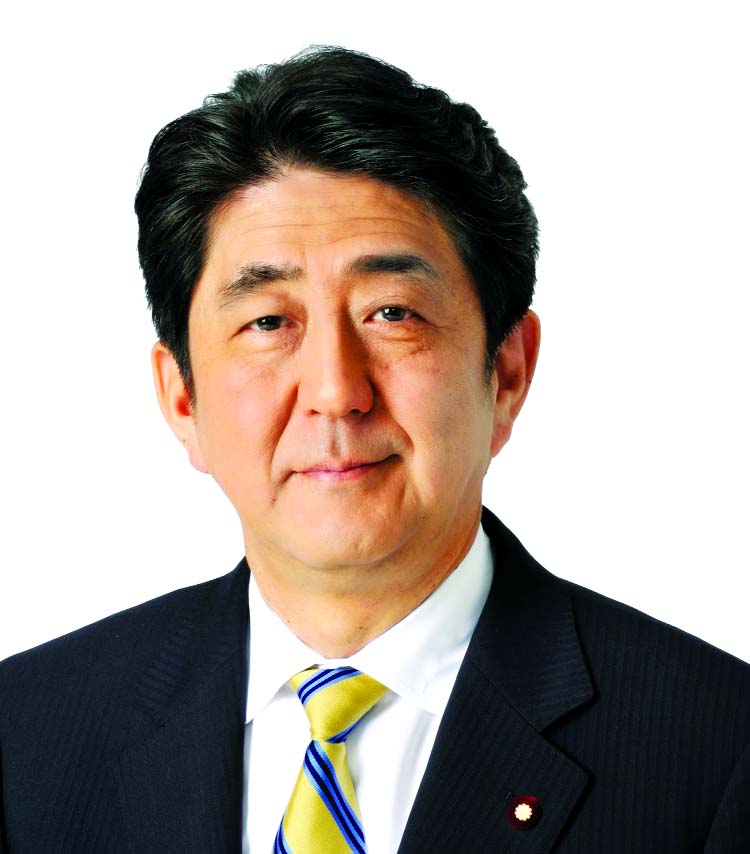
bdnews24.com :The Bay of Bengal Industrial Growth Belt (BIG-B) initiative is the “centrepiece” of Japanese cooperation in Bangladesh, Prime Minister Shinzo Abe has said.In his first speech during his less than 22-hour tour of Bangladesh, he sought support of businessmen from both sides for the mutual growth of the two countries like “brothers and sisters”.Speaking in Japanese, at a Bangladesh-Japan Business Forum event at Pan Pacific Sonargaon Hotel where he is staying, he said he would “promote” trade and investment in Bangladesh.Bangladesh was “very important” for him for its location between South East Asia and India.He said the country was also important for implementing his “Abenomics”, a much-talked-about economic policy he has adopted to inflate the decade long deflated Japanese economy.”I am promoting Abenomics in Japan to lead Japanese economy. To me Bangladesh is very important to enhance trade and investment of Japan because I am leading Abenomic to lead Japanese economic growth.””That’s why I chose Bangladesh for my visit today,” he said.He arrived, along with his wife Akie Abe, at about 1pm on Saturday in a first visit of any Japanese prime minister to Dhaka after 14 years.Prime Minister Sheikh Hasina received him at Hazrat Shahjalal International Airport in a rousing reception.He went straight to the National Memorial in Savar from airport to pay respect to 1971 Liberation War heroes.Then he went to the Bangabandhu Memorial Museum at Dhanmondi to pay homage to the Bangladesh’s founding father before delivering a brief speech to businessmen of both sides.Businessmen of both sides including top executives of Japanese infrastructure, finance, garment, medical, food and safe water companies who are accompanying him were present during the speech.Bangladesh’s ministers for commerce, industries and junior minister for foreign affairs were also present.Abe said both countries entered “a new level of cooperation” which was reflected in the frequent high-level visits.In this context he referred to his own visit, Sheikh Hasina’s visit to Japan in May and Japanese foreign minister’s Dhaka visit in March.”This year is a memorable and special year for Japan, Bangladesh relations,” he said.He mentioned the $6 billion loan promise he made for the next four to five years including this year’s $1.2 billion during Hasina’s visit and said these were all under Japan’s BIG-B concept.Japan has a grand design of combining the two oceanic regions – Pacific Ocean and Indian Ocean – for more geo-political space to boost its economy.The largest Bay in the world, Bay of Bengal forms the north-eastern part of the Indian Ocean. Bangladesh is located in the north of this Bay.Abe mentioned three dimensions of the BIG-B concept.One is to promote infrastructure improvement for industrial development, second is to create better environment for investments and last to promote improved “solidarity and unitedness” in the region including Bangladesh.Specifically, he said improvement of transportation and infrastructure, stable supply of power and energy, urban development including special economic zone improvement, and also public sector development including improved market access to the financial market were the key to the BIG-B concept.He expressed his hope that in those areas Japanese technology would be “fully leveraged and used in Bangladesh”.”….by doing so it will bring mutual benefit and prosperity to the two countries,” he said.He also highlighted Matarbari power generation project near the port city of Chittagong in his speech terming it as one of the “flagship” cooperation between the two countries.But for promoting investments, he said, “voices of Japanese investors should be heard in making investment friendly environment.”He highlighted the role of Japanese companies in Bangladesh’s infrastructure development and said “this Sonargaon Hotel (where he spoke) was constructed by Japanese companies using Japanese Yen loan”.Japan is the largest aid donor of Bangladesh.Abe said he was “surprised to see that so many Bangladesh’s apparels in Japanese store” that he said was “inconceivable” even ten years ago.He said it was because of duty-free market access facilities of Bangladesh’s ready-made clothes.He also mentioned the “comprehensive partnership” both leaders launched in May, and said businessmen of both sides were “very important players” to achieve the partnership.Cooperation toward attaining global peace and stability, economic cooperation leading towards the promotion of mutual interest and regional prosperity, and promotion of cultural and people to people exchanges were the three highlights of the partnership.Japan also wants Bangladesh’s support for a non-permanent seat in the UN security-council in which Dhaka is the other contender. One will be elected in the next year’s elections.Abe, however, did not mention anything about it in his speech.But, pointing at the flags of both the countries, he said, “we are going to help each other like sisters and brothers and we are aiming to grow mutually together.”Bangladesh and Japan’s flags are rectangular in size with red circle on the body of green and white respectively.After his speech, he left the hotel for Prime Minister Sheikh Hasina’s office where both leaders will hold summit meeting.They will issue a joint statement detailing further bilateral cooperation after the meeting.

